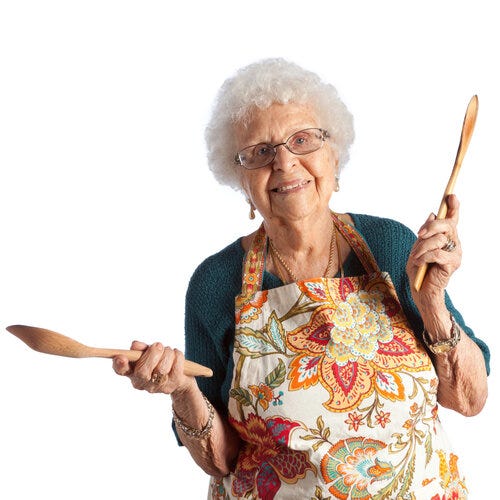60 Minutes of Inspiration
Get 3,000 years of collective life experience in one exhilarating hour
From time to time I try to offer words of inspiration for those of us aging with grace, purpose, and joy. But nothing I could write or say can possibly match the impact of a wonderful documentary called Lives Well Lived. It aired on some PBS channels this month. If you missed it, you can watch it online at http://www.lives-well-lived.com. It is well worth it.
The filmmaker, Sky Bergman, introduces us to a number of people ranging in age from 75 to 103. The oldest is her own grandmother, Evelyn Ricciuti (pictured above), who inspired her to make the film. Each has a unique story to tell. All, despite living through some of the worst experiences of the 20th century, are full of optimism and zest.
The stars include Ricciuti, who works out at the gym and makes amazing Old World dishes to die for; Blanche Brown, a former civil rights activist who quilts and teaches Afro Haitian dance, despite a pacemaker and a titanium knee; Paul and Marion Wolff, whose childhoods were disrupted by the Holocaust; Susy Eto Bauman, who was interned with other Japanese Americans during World War II; and Emmy Cleaves, teaching yoga at 86. All these elders share their wisdom on what makes a life well lived.
It is fun, yet moving. I cannot recommend it more highly.
Your Take – Quite an Earful
Last week’s post on hearing aids and the emerging “hearables” products generated considerable comment. Here are some of the highlights.
Price Resistance:
Depending on your type of hearing loss, I don’t think a hearing aid has to be thousands of dollars. My husband has a very soft voice. Believe me, we know the friends and acquaintances that are not acknowledging their need of a hearing aid.
Point:
The emphasis on not wanting to look like you need hearing aids/not look old is the typical and unhealthy American obsession with youth and the concomitant dismissal of old age as undesirable. Aging is natural and even valued – as in other societies. Let’s try and get rid of the notion that it’s embarrassing.
…And Counterpoint:
I appreciate the observation that it would be great if the embarrassment factor would go away, but that’s a wish, not a reality anytime soon. That embarrassment factor is there. Solving people’s hearing loss is more urgent and more doable than changing lifelong society habits. So while we work on those habits, providing those with hearing loss with solutions right now that make them less resistant to using hearing aids is critical.
A Cautionary Tale:
I was an avid hunter in my younger days and shot many guns without hearing protection. We just didn’t think we needed it. Then on July 4, 2004, a friend fired a pistol near me and the hearing in my right ear totally disappeared. All I had was a loud hum…The nerve was damaged beyond repair. To this day, all I hear from my right ear is hummmmmmm…24 hours a day. Hearing aids won’t help because the auditory nerve is gone. I am now a big advocate to my hunting friends to make sure they and their children wear hearing protection when firing guns.
Deep Background:
Hearing loss due to age is called “presbycusis.” It stems from damage both to hair cells in the cochlea (inner ear) and the spiral ganglion cells of the 8th cranial nerve that carry signals to the brain. Most affected is the basal turn of the cochlea that encodes high frequency consonant sounds that give speech its clarity. For example: look in the mirror and say silently, “bad,” “mad,” “ban,” or “man.” Hard to distinguish between those words visually, isn’t it?
And The Last Word:
Helen Keller famously remarked, “Blindness separates us from things, but deafness separates us from people.”





We loved this documentary. So nice to see old age coupled with joy rather than decline!
Great recommendation, Don. I’m sure a lot of younger people could learn from this. Some of the people you highlighted are more active than I am 😉